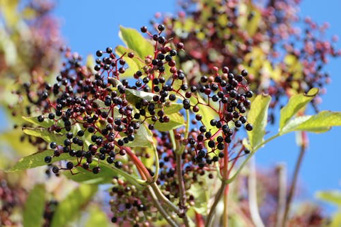As everyone hustles to get ready for back to school, we wanted to share an herb that is very safe, tastes great, is very effective, and can be taken every day. Even your kids will love the taste of it. Elderberry, Sambucus Nigra, is an excellent herb to prevent all of those cold and flu viruses you may come into contact with as part of the back to school rush.
Qualities: Anti-viral, Diaphoretic, Alterative, Stimulant, Expectorant, Diuretic, Mild Laxative, Immune Modulation, Antioxidant
Uses: Dispel cold, flu, fever, cough, chronic sinusitis, night sweats, rheumatism, and neuralgia. Also parts of elder flower are used to soothe the skin healing burns, cuts, scratches, sores, and abrasions including dermatitis from exposure to poison ivy or poison oak.
Description: Slightly sweet. Generally taken in the form of shredded or powdered dried flower or concentrated berry juice by means of capsule, tea, or extract. This herb has a long history us use in many different traditions. It was documented and widely used in Ancient Egypt and has been found in tombs along with recipes for its use. It has also been used by Arabic healers who made a heavy syrup called a “rob.” This rob was used in hospitals to soothe coughs, colds, and sore throats. And it has also been widely used by healers in Germany, and Mexico for similar reasons.
Sambucus Nigra’s ability to decrease fevers, soothe sore throats, and assist with coughs and sinusitis makes it a great support herb for colds and flus. It is an immune modulator, so it helps the body respond to stress. It also is excellent for increasing the elimination of metabolic waste which is why it is helpful for skin conditions such as poison ivy and poison oak. It is also a natural diuretic, which helps with the elimination of edema.
Sambucus Nigra is an amazing herb with an abundance of clinical uses, as well as research. Recent research holds promise in its ability to assist with immune system support, antiviral properties, and treatment of cold and flu symptoms including fever and cough.
Warnings: Sambucus Nigra can cause irritation to the gastrointestinal tract. These effects can vary widely. People taking pharmaceutical medications for these conditions, or for any other serious illness, should always consult their prescribing doctor before taking this herb.

References:
Curtin, L.S.M (1997). Healing Herbs of the Upper Rio Grande: Traditional Medicine of the Southwest. Santa Fe, NM: Western Edge Press.
Della Volpe, A., Ricci, G., Ralji, M., Garmbacorta, V., et al. The effects of oral supplements with Sambucus nigra, Zinc, Tyndallized Lactobacillus acidophilus (H122), Arabinogalactans, vitamin D, vitamin E and vitamin C in otitis media with effusion in children: a randomized controlled trial, Eur Rev Med Pharmacology Science. Volume 23, Issue 14, July 2019, 6360-6370.
Roxas, M., Jurenka, J. Colds and Influenza: A Review of Diagnosis and Conventional, Botanical, and Nutritional Considerations, Alternative Medicine Review. Volume 12, Issue 1, 2007, 25-48.
Smith, E. (2008). Therapeutic Herb Manual: A Guide to the Safe and Effective Use of Liquid Herbal Extracts. Williams, OR: Self Published.
Tierra, L. (2003). Healing with the Herbs of Life. New York, NY: Crossing Press.
Tilgner, S.M. (2009). Herbal Medicine From the Heart of the Earth, 4th edition. Pleasant Hill, OR: Wise Acres LLC.
Vlachojannis, J.E., Cameron, M., Chrubasik, S. A systemic review on the sambuci fructus effect and efficacy profiles, Phytotherapy Research. Volume 24, Issue 1, January 2010, 1–8.
Caution: Herbal products contain phytochemicals in potencies that are not ordinarily found in typical food sources and may produce a powerful physiologic effect, therefore indiscriminant use of any herbal product is not recommended except under the direction of a trained health care professional. In addition to the phytochemical effect, there may be drug interactions that may produce reactions or interfere with the efficacy of prescription medication.
